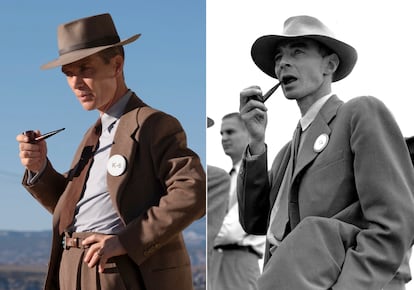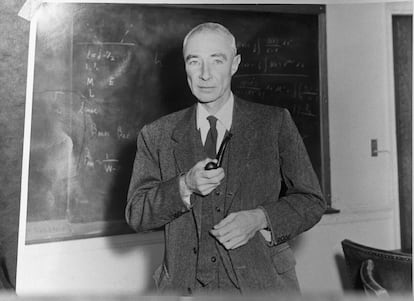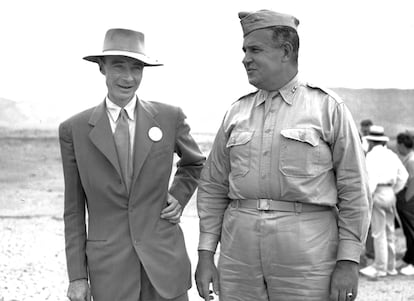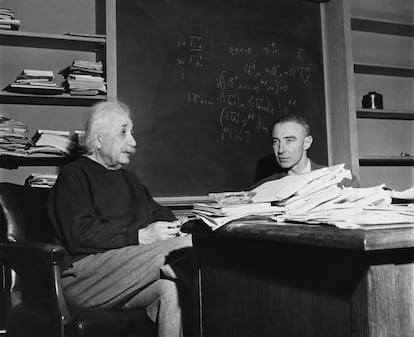The schizophrenia, intelligence, rage and delicacy of Robert Oppenheimer
The scientist responsible for the Manhattan Project, which developed the atomic bomb, was one of the most unique figures of the 20th century due to his enigmatic and complex nature

Yugoslavia’s postgraduate physics summer schools were very much to the liking of us young PhDs in 1980. The Adriatic stretched out before John, Dora, and myself. Although our meetings were sporadic, we always liked each other. There were three topics in our conversations. Dora’s favorite was the political situation in Spain. John’s was my work on reactions between heavy cores. Mine was, avoiding as much as possible any delicate allusions, to inquire about some of the intricacies of the Manhattan Project, of which I knew John was one of the leading experts. John loosened up a bit at Dora’s blank stare and after a while of listening to him raptly, I asked the fatal question: “What was Robert Oppenheimer like?” John’s everlasting smile was barely dulled, but Dora gave me a serious look, then smiled, got up and ruffled my hair before walking away. I apologized to John (Robert Huizenga) and was sorry to lose the company of his young wife, Dorothy Koeze.
From then on, I began to research the scientific director of the first atomic bomb. I read a lot about him, but what interested me most was the testimony of some of his colleagues and, above all, of the disciples of those who were more or less my age. The greatest source of information I obtained, as is logical, was during the 18 years that I collaborated with the Niels Bohr Institute in Copenhagen.
Thursday July 19 sees the release of a movie dedicated to Oppenheimer, which promises to be the cinematic revelation of 2023. And I would not be surprised if it were so because it deals with one of the most unique figures of the 20th century, due to his enigmatic and complex character and the circumstances in which he lived.
Julius Robert Oppenheimer was born in New York in 1904, into a wealthy family of Jewish and German origins. Possibly the most remarkable thing about his adolescence was the diagnosis he was given to explain his dark character: dementia praecox, i.e. schizophrenia. He was always enormously generous as well as petty and arrogant; puny, in poor health and aggressive to the point of two attempted murders; a pacifist in character, but a reckless horseman and daring navigator; hated and idolized; sexually confused and loved by women of singular intelligence and strong personality. I highlight only the latter and invite further research on Charlotte Riefenstahl, Jean Tatlock and Katherine “Kitty” Puening. The first left him to marry, twice, Fritz Houtermans, a nuclear physicist whom the Nazis arrested and tortured as a suspected Soviet spy, and given the same treatment by the Stalinists who accused him of being a Nazi spy.
Tatlock was a communist and psychiatrist of great renown, who eventually committed suicide. Kitty, with whom Oppenheimer had two children, was the widow of an International Brigade fighter in Spain, a fiery communist who was shot at the Ebro. Robert always denied having been a communist, but his brother Frank was, and he himself contributed decisively with oratory and finances to the defense of the Spanish Republic.

Oppenheimer was so extraordinarily intelligent that he could learn difficult languages, such as Dutch or Sanskrit, in months and assimilate any physical theory, no matter how complex. That is what he did with quantum mechanics when his parents financed a long stay in Europe. There he met the patriarch of that science, the Dane Niels Bohr. When he returned to the United States, he realized that no one in the country had any awareness of the new physical science, proclaiming Bohr was God and Oppenheimer his prophet. Among the great European physicists there was a consensus that Oppenheimer’s ideas were interesting, but his calculations were wrong. His mathematics failed him and he could not set foot in a laboratory without messing something up. The former he gradually fixed; the latter he didn’t even attempt. He became a disastrous professor and a revered teacher of doctoral students.
The last thing that I believe characterized Oppenheimer was how he replied to his friend, the great Jewish physicist Isidor Rabi, when the latter commented that he was puzzled by Christianity’s combination of blood and gentleness: “That is exactly what attracts me the most.”
Nuclear fission
As soon as the Germans Strassmann and Hahn suspected that they had found fragments of a heavy nucleus and Frish and his aunt Lise Meitner explained the mechanism of this nuclear fission, it was intuited that they were on the verge of the possible release of an enormous amount of energy. Einstein and, above all, the Hungarian Leó Szilárd, wrote to the then-president of the United States, the progressive Franklin D. Roosevelt, to alert him that Germany had the scientific and technological capacity to develop an atomic bomb, which would undoubtedly secure Nazi victory in the Second World War.
The United States had long since been imbued with anti-communism and so faced a dilemma with war in Europe unleashed. If its natural allies fell to Nazism, Washington’s role in the future would be blurred. But the Soviet Union was fighting the Nazis most fiercely. After the theatrical but fake pact between Stalin and Hitler, the Russians had become the greatest ally of free Europe and the United States. If the Nazis developed an atomic bomb, the future would be decided; but if the Soviets overwhelmed Hitler’s forces, that future, although in the opposite direction, would be as distant from the American spirit as Nazi ideology.

The first calculations were shocking: developing an atomic bomb would involve the work of tens of thousands of people headed by the best physicists and engineers in the country, with a staggering financial investment and with the U.S. Army marshalling the entire organization. The project was codenamed Manhattan because that was where the headquarters of the U.S. Army Corps of Engineers was based. The military head of this vast organization was easily decided: Major General Leslie R. Groves, who had just directed the construction of the largest building in the world at the time, the Pentagon.
The main problem was who would lead the scientists. It was a dilemma for Washington: in terms of intelligence, leadership ability among equal and, above all, superior scientists, subject versatility, personal knowledge of the German physicists undoubtedly involved in the Nazi bomb, and many other characteristics, the ideal candidate was Robert Oppenheimer. But because of his avowedly communist tendencies, if there was any scientist who could be considered unqualified for the position of scientific director of the project, it was him. And that is where the overwhelming personality of General Groves came into play. If Oppenheimer was suitable to lead the project, Groves was responsible for the possible consequences of his ideology. One of the comments made by Oppenheimer when he accepted the job — to the considerable concern of the military — was that if the Spanish Republic had held out a little longer, Franco and Hitler would have shared the same grave.
The Manhattan Project was one of the greatest scientific feats in the history of mankind, accomplished in only two and a half years, but the result was so terrible that it was considered to be the end of physics, if not the end of science. The scientists and engineers who were decisive in the success of the project revolted when they saw that the mediocre and artful Harry S. Truman, who had replaced Roosevelt after the latter’s death, could accede to the wishes of the military and use the bomb on a civilian population that was not only unarmed but also defeated. Germany was destroyed from the ground up, Hitler had committed suicide months earlier and Japan, after being razed to the ground with napalm, was discussing terms of surrender.

Months earlier, the Manhattan physicists had proposed inviting Russian scientists to Los Alamos, the headquarters of the project, and to make the results of the science, as the field had always been, the heritage of mankind. Secrecy would only lead to a global nuclear arms race. The main proponent of the idea, the renowned Niels Bohr, is said to have been threatened by Winston Churchill when he suggested that this position would prove to be “deadly.”
But these are stories that Christopher Nolan’s film will undoubtedly reveal with full rigor and drama, as well as reflecting the complex personality of one of the most decisive and disturbing characters of the 20th century.I sometimes recall Dora Huizenga’s kindly rebuff that sunset on the Adriatic, as well as the countless conversations I have had with other nuclear physicists of my baby boomer generation. I think we all, particularly those of a progressive disposition, have come to the same conclusion that will haunt us until we have died out: if we had been faced with the choice of whether to join the Manhattan Project and participate in its terrible outcome, we would have agreed.
Sign up for our weekly newsletter to get more English-language news coverage from EL PAÍS USA Edition
Tu suscripción se está usando en otro dispositivo
¿Quieres añadir otro usuario a tu suscripción?
Si continúas leyendo en este dispositivo, no se podrá leer en el otro.
FlechaTu suscripción se está usando en otro dispositivo y solo puedes acceder a EL PAÍS desde un dispositivo a la vez.
Si quieres compartir tu cuenta, cambia tu suscripción a la modalidad Premium, así podrás añadir otro usuario. Cada uno accederá con su propia cuenta de email, lo que os permitirá personalizar vuestra experiencia en EL PAÍS.
¿Tienes una suscripción de empresa? Accede aquí para contratar más cuentas.
En el caso de no saber quién está usando tu cuenta, te recomendamos cambiar tu contraseña aquí.
Si decides continuar compartiendo tu cuenta, este mensaje se mostrará en tu dispositivo y en el de la otra persona que está usando tu cuenta de forma indefinida, afectando a tu experiencia de lectura. Puedes consultar aquí los términos y condiciones de la suscripción digital.








































